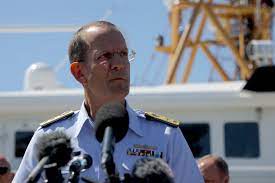
There has been a tragic conclusion to the four-day search for the missing submersible, Titan, in the North Atlantic, after the five crew members were all declared by the US Coastguard to have died.
This was after debris was discovered on the sea bed, near to the wreck of the Titanic, which proved to be from the vessel and was consistent with what has been described as a “catastrophic implosion”.
The mini-sub had disappeared on Sunday 18 June, when an hour and 45 minutes into a dive to explore the famous liner, all communication was lost.
This led to a huge international search involving forces and officials from the US, Canada, the UK, and France, who worked tirelessly in the hope of locating the vessel in the knowledge that there was only 96 hours of oxygen available, but it now seems that their efforts were all in vain.
Heartbreaking discovery of debris
There were five separate pieces of debris from the Titan that were found, including the landing frame and tail cone. They were located by a remote-controlled underwater search vehicle (ROV) about 1,600 feet (480m) from where the Titanic lies.
Earlier this week, authorities reported that Canadian aircraft had detected underwater sounds, which raised hopes that it could be sign that the passengers were still alive, but it would now seem that this had no connection and most experts believe the submersible probably blew apart at the same time as communication was lost.
Five lost souls
The five who have died in the tragedy are: 58-year-old British adventurer Hamish Harding; 48-year-old British businessman Shahzada Dawood, and his 19-year-old student son, Suleman; French Navy diver Paul-Henry Nargeolet, who at 77-years-old was a veteran Titanic explorer and was part of the first expedition to visit it in 1987; and Stockton Rush, the 61-year-old chief executive of OceanGate, the operator of the stricken voyage.
Rear Admiral John Mauger of the US Coastguard, said he could not answer the question on whether the bodies of the five men on-board were likely to be recovered. He made the point that the seafloor is an “incredibly unforgiving environment”, but did confirm that the ROV’s will remain in the area, as the investigation into what happened continues.
Operator’s statement
In a statement from OceanGate, the company opened by saying that their hearts were with the five souls and every member of their families and that they grieved the loss of life and joy that they brought to everyone they knew. They labelled all those onboard as “true explorers who shared a distinct spirit of adventure” and praised their passion for protecting the world’s oceans.
They went on to say: “This is an extremely sad time for our dedicated employees who are exhausted and grieving deeply over this loss.”
They said that the entire OceanGate family were grateful for the countless men and women from multiple organisations of the international community, who expedited wide-ranging resources and worked so hard on the mission.
The message added that it was a very sad time for the entire explorer community, and for each of the family members of those lost at sea. Closing their statement they said: “We respectfully ask that the privacy of these families be respected during this most painful time.”
Instantaneous implosion
The co-founder of OceanGate, Guillermo Söhnlein, said that when operating at such a depth as the Titan had gone, the pressure is so great on any sub that if there is any failure, sadly it would be an instantaneous implosion. “If that’s what happened that’s what would have happened four days ago,” he said.
Coastguard pays respect
The coastguard offered their own deepest condolences to the families, with Rear Adm Mauger saying: “I can only imagine what this has been like for them,” before adding that they were committed to making sure that they have an understanding, as best as is possible, as to what exactly happened and to try and help them begin to find some closure.
“There’s a lot of questions about how, why and when this happened and those are questions that we will collect now while governments meet and discuss an investigation” he said.
He confirmed that they had also been in close contact with the French and British consuls general to ensure that both were fully apprised, and that their concerns were being fully addressed.













0 Comments